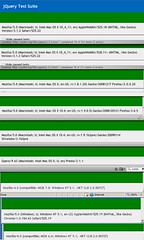jQuery 1.3.1 Released
Welcome Digg users! You may be interested in the full jQuery 1.3 release, which just happened on the 14th. Enjoy!
This is a bug fix release for jQuery 1.3. You can view the full list of what was fixed on the bug tracker.
There are no significant changes in 1.3.1 from 1.3 other than straight bug fixes. If you are still using jQuery 1.2.6, and looking to upgrade, please upgrade directly to this release.
Downloading
- jQuery Minified (18kb with Gzipping)
- jQuery Regular (114kb)
A copy of jQuery 1.3.1 is also available on Google’s CDN (feel free to copy the URL directly into your site):
If you wish to checkout the full release from the Subversion repository, you can do so by following the following instructions and checking out the source from the following location:
svn co http://jqueryjs.googlecode.com/svn/tags/1.3.1
A couple quick housekeeping notes:
Some noted in the release notes for 1.3 that we missed testing on Firefox 2, even though we still support it. This was a mistake on our part: We still support Firefox 2 and test on it prior to releases. You can see the full test suite run below.

It was also noted that Safari 2 didn’t show up in the list of browsers that we tested against prior to the 1.3 release. This is correct – we are phasing out support for Safari 2 in jQuery. Considering that Safari 2 shows no appreciable market share and has been superseded by 3 separate Safari releases (3.0, 3.1, and 3.2) we no longer see a need for significant testing against that release.
Finally, a few users noticed that we no longer provide a “packed” version of jQuery (a version of jQuery run through Dean Edwards’ Packer with Base62 encoding turned on). We did this for a couple reasons:
- Packed scripts are significantly harder to debug (even harder than minifed scripts).
- Packed scripts aren’t able to run on all platforms without issue (such as Adobe AIR and Caja-capable environments).
- But most importantly: Packed scripts are slower for the user than what you would get from using just minification. This may seem counter-intuitive since a packed script’s file size is smaller than a minified script but the final load time ends up being much higher (due to the decompression step it must go through). We have some data regarding the loading performance of minified scripts vs. packed scripts, for those that are interested.
The minifed copy of jQuery that we provide, run through the YUI Compressor, should be the optimal form of jQuery to use in a production environment (served using gzipping, if possible).
Pingback: The Future of the Web » Articles » Web Development with JavaScript, jQuery, PHP and MySQL | mobile.itsmyiq